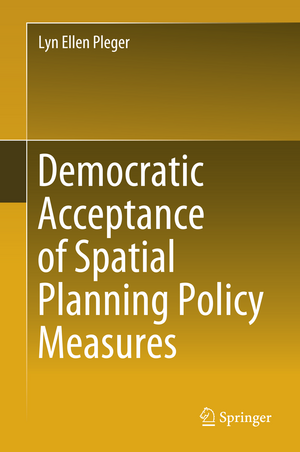Democratic Acceptance of Spatial Planning Policy Measures
Autor Lyn Ellen Plegeren Limba Engleză Hardback – 27 iun 2018
In this work, the democratic acceptance of spatial planning instruments is investigated from various perspectives in the form of original empirical studies, which are embedded in an innovative conceptual framework. It demonstrates that not only spatial planning instruments in general, but also incentive-based instruments in particular, generally enjoy high acceptance. This finding is remarkable, considering the fact that efficient land use instruments have only been marginally implemented. Addressing the needs of both academics and land use practitioners in the private and public sector, the book shows that in order to improve the democratic acceptance of spatial planning measures, attention must be paid to their context, content and the means by which that content is provided.
| Toate formatele și edițiile | Preț | Express |
|---|---|---|
| Paperback (1) | 693.25 lei 43-57 zile | |
| Springer International Publishing – feb 2019 | 693.25 lei 43-57 zile | |
| Hardback (1) | 643.00 lei 43-57 zile | |
| Springer International Publishing – 27 iun 2018 | 643.00 lei 43-57 zile |
Preț: 643.00 lei
Preț vechi: 756.47 lei
-15% Nou
Puncte Express: 965
Preț estimativ în valută:
123.05€ • 127.69$ • 102.85£
123.05€ • 127.69$ • 102.85£
Carte tipărită la comandă
Livrare economică 17-31 martie
Preluare comenzi: 021 569.72.76
Specificații
ISBN-13: 9783319908779
ISBN-10: 3319908774
Pagini: 266
Ilustrații: XVI, 205 p. 29 illus.
Dimensiuni: 155 x 235 mm
Greutate: 0.49 kg
Ediția:1st ed. 2019
Editura: Springer International Publishing
Colecția Springer
Locul publicării:Cham, Switzerland
ISBN-10: 3319908774
Pagini: 266
Ilustrații: XVI, 205 p. 29 illus.
Dimensiuni: 155 x 235 mm
Greutate: 0.49 kg
Ediția:1st ed. 2019
Editura: Springer International Publishing
Colecția Springer
Locul publicării:Cham, Switzerland
Cuprins
Introduction.- Sustainable Spatial Planning in Democracies.- Democratic Acceptance of Spatial Planning Policies.- Determinants of Democratic Acceptance: A Two-Level Analysis.- The Motivation behind Democratic Acceptance: A Case Study.- Framing Effects on Democratic Acceptability: An Experimental Approach.- Discussion.-Conclusions.
Textul de pe ultima copertă
This book examines the democratic acceptance of spatial planning measures, using Switzerland as a case study. The currently inefficient land use in industrialised countries calls for new spatial planning policies. Yet governments have largely failed to implement innovative policy measures, which may be due to a lack of democratic acceptance. To date, little is known about the democratic acceptance of spatial planning measures. Switzerland offers a promising candidate because of its direct-democratic system, which allows citizens’ preferences for specific policy measures to be directly measured.
In this work, the democratic acceptance of spatial planning instruments is investigated from various perspectives in the form of original empirical studies, which are embedded in an innovative conceptual framework. It demonstrates that not only spatial planning instruments in general, but also incentive-based instruments in particular, generally enjoy high acceptance. This finding is remarkable, considering the fact that efficient land use instruments have only been marginally implemented. Addressing the needs of both academics and land use practitioners in the private and public sector, the book shows that in order to improve the democratic acceptance of spatial planning measures, attention must be paid to their context, content and the means by which that content is provided.
Caracteristici
Covers a highly current topic that has not been approached systematically by either researchers or practitioners Characterised by interdisciplinary approaches at different levels and using different theoretical frameworks, e.g. psychological and voting behaviour theories, which are applied to spatial planning Theoretical considerations and concepts are tested empirically by means of various methods (e.g. Bayesian multilevel modelling or an experimental approach) Provides ten very concrete and realistic recommendations for political practice, translating the empirical and theoretical findings into guidelines for political decision-makers
